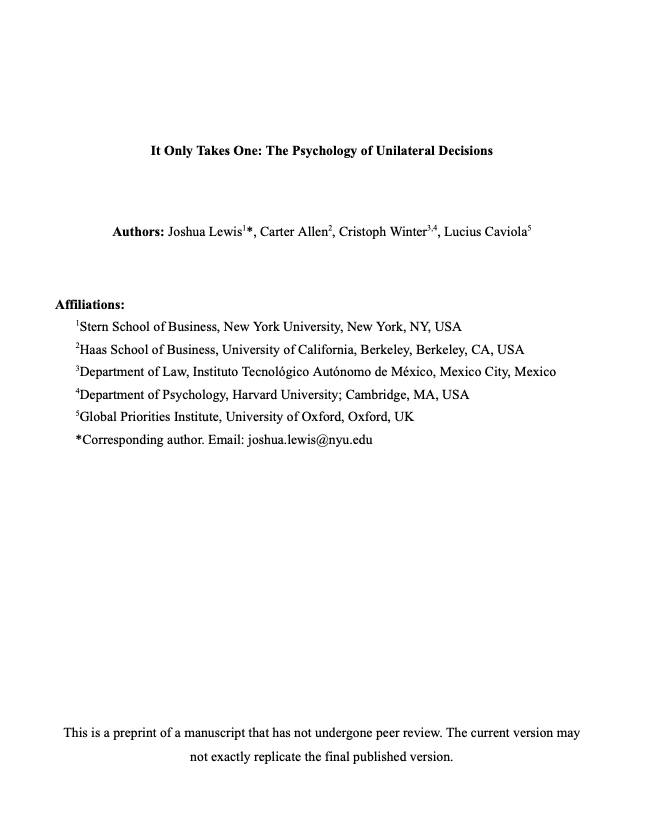It Only Takes One: The Psychology of Unilateral Decisions
Joshua Lewis (New York University), Carter Allen (UC Berkeley), Christoph Winter (ITAM, Harvard University and Institute for Law & AI) and Lucius Caviola (Global Priorities Institute, Oxford University)
GPI Working Paper No. 14-2024
Sometimes, one decision can guarantee that a risky event will happen. For instance, it only took one team of researchers to synthesize and publish the horsepox genome, thus imposing its publication even though other researchers might have refrained for biosecurity reasons. We examine cases where everybody who can impose a given event has the same goal but different information about whether the event furthers that goal. Across 8 experiments (including scenario studies with elected policymakers, doctors, artificial-intelligence researchers, and lawyers and judges and economic games with laypeople, N = 1,518, and 3 supplemental studies, N = 847) people behave suboptimally, balancing two factors. First, people often impose events with expected utility only slightly better than the alternative based on the information available to them, even when others might know more. This approach is insufficiently cautious, leading people to impose too frequently, a situation termed the unilateralist’s curse. Second, counteracting the first factor, people avoid sole responsibility for unexpectedly bad outcomes, sometimes declining to impose seemingly desirable events. The former heuristic typically dominates and people unilaterally impose too often, succumbing to the unilateralist’s curse. But when only few people can impose, who know the stakes are high, responsibility aversion reduces over-imposing.
Other working papers
Is Existential Risk Mitigation Uniquely Cost-Effective? Not in Standard Population Models – Gustav Alexandrie (Global Priorities Institute, University of Oxford) and Maya Eden (Brandeis University)
What socially beneficial causes should philanthropists prioritize if they give equal ethical weight to the welfare of current and future generations? Many have argued that, because human extinction would result in a permanent loss of all future generations, extinction risk mitigation should be the top priority given this impartial stance. Using standard models of population dynamics, we challenge this conclusion. We first introduce a theoretical framework for quantifying undiscounted cost-effectiveness over…
Once More, Without Feeling – Andreas Mogensen (Global Priorities Institute, University of Oxford)
I argue for a pluralist theory of moral standing, on which both welfare subjectivity and autonomy can confer moral status. I argue that autonomy doesn’t entail welfare subjectivity, but can ground moral standing in its absence. Although I highlight the existence of plausible views on which autonomy entails phenomenal consciousness, I primarily emphasize the need for philosophical debates about the relationship between phenomenal consciousness and moral standing to engage with neglected questions about the nature…
Longtermist political philosophy: An agenda for future research – Jacob Barrett (Global Priorities Institute, University of Oxford) and Andreas T. Schmidt (University of Groningen)
We set out longtermist political philosophy as a research field. First, we argue that the standard case for longtermism is more robust when applied to institutions than to individual action. This motivates “institutional longtermism”: when building or shaping institutions, positively affecting the value of the long-term future is a key moral priority. Second, we briefly distinguish approaches to pursuing longtermist institutional reform along two dimensions: such approaches may be more targeted or more broad, and more urgent or more patient.

